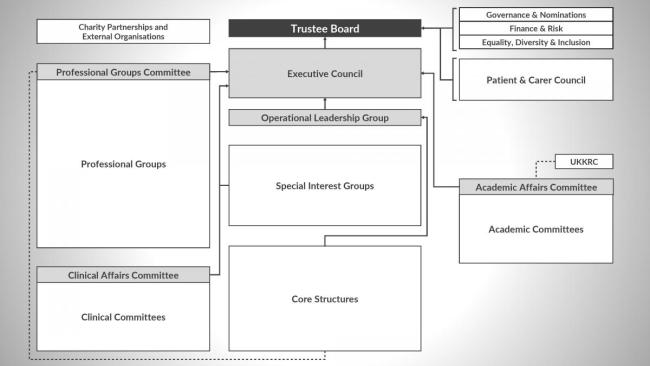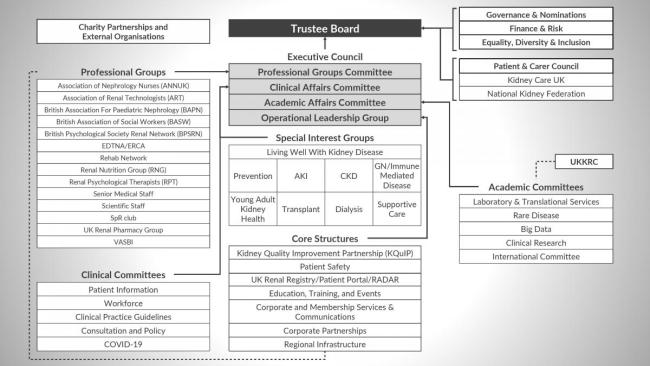As president of the Renal Association, and on behalf of the RA trustees, I want to highlight an imminent major opportunity for which we will seek approval through a vote of RA membership, opening on 17th December 2020 and closing 11th January 2021.
The Trustees, after careful discussion within the RA Council, two years engagement with BRS/Affiliates and due diligence, are in strong support of closer joint coordinated working with our MPT colleagues and merger of the RA, BRS and the MPT affiliates to create a ‘new' organisation, the UK Kidney Association (UKKA). At the recent RA AGM the membership approved changes in our Articles which enabled merger and required a subsequent vote of the membership seeking approval of this.
Together we aim to create a new, dynamic representative national, democratic membership organisation, the UK Kidney Association, including the jewel in our crown, the RA Registry, and all our professional arms incorporating the strengths of the RA, BRS and Affiliates.
We feel this is the best way to achieve the charitable objectives of the RA. In proposing these changes we have responded to the wishes of you, the members. On consultation a significant majority of you supported a merged organisation and the proposed changes are strongly supported by the RA council.
The kidney community have big ambitions, including building on substantial past RA achievements. Closer working is a key aim of the RA strategy. We have demonstrated the effectiveness of this approach through consistent recent collaboration with the MPT groups. Many of our best achievements have come through joint initiatives including UKKW, KQuIP, patient safety, patient information and comprehensive COVID-19 support. There are major benefits for our members including economies of scale, opportunities for workforce modernisation and coordination to be realised and possibilities to create high achieving speciality interest groups (SIGs) in major areas of practice. These would work closely with the current structures including guidelines, patient safety, QI and research. A merged Association would have greater influence across England and the devolved nations on healthcare commissioning, clinical and laboratory research and industry.
There are substantial opportunities just around the corner for all renal clinicians to further improve care. The Renal GIRFT initiative and Renal Services Transformation Programme are due to report and support clinicians to deliver the care to which we aspire. Improved coordination of the professional societies, working together with patient charities, is the key to taking this once in a decade opportunity.
We can all be very proud to be part of our UK kidney family, which has worked selflessly during COVID-19, with real energy and innovation, to deliver optimal clinical care. The RA Registry has been central to this. I thank the RA which has strongly supported its members and the broader kidney community during this time, achieved through effective joint working with the BRS/MPT affiliates, patients, and commissioners of NHS healthcare. The RA continues to update the COVID-19 section of its website.
I take this opportunity to thank those members who have contributed. With the approval of COVID-19 vaccination we have light at the end of the tunnel that we can re-focus on improving patient care. All this work shows how the community is most productive when we work in a joined up manner. We are stronger together and the sum is greater than its parts.
Dr Graham Lipkin
A joint proposal from The Renal Association and The British Renal Society


The UK Kidney Association (UKKA) exists to support the multi-professional team in the delivery of kidney care, education and research - enabling people to live well with kidney disease.
The Association comprises the professional groups, the UK Renal Registry, and other core committeesand structures. It is built on a strong governance foundation consisting of the Trustee Board with 3 supporting, trustee lead committees: Governance & Nominations; Finance & Risk and Equality, Diversity & Inclusion.
UKKA is focused on delivery through a series of multi-professional special interest groups supported and enabled through core structures.
Special Interest Groups (SIGs) are at the centre of the organisation and cover major areas of clinical practice. They have an agreed leadership structure with multi-professional chairs, and a faculty with broad representation from the kidney care community.
The SIGs are supported by the technical expertise that is contained within Core Structures and the Clinical and Academic Committees. They commission work from its members and the UKKA infrastructure to prioritise work stream.
With standard operating procedures SIGs define the relationship with the core structures and representation on clinical and academic committees.
Development of the SIGs is organic, they integrate into the Clinical Affairs Committee, and have terms of reference, the structure is flexible to add in additional groups where required.
Areas of focus include: the use of data and measurements; quality improvement and implementation; clinical and operational guidelines and patient information.
Each SIG includes one or more members of the core structures, clinical and academic committees or an elected executive council member.
The relationship between the SIG and the academic committees depends on the priorities of the SIG and include links with the relevant clinical study groups of the UKKRC.
The Professional Groups include all the affiliates of the UKKA along with the BAPN, Senior Medical Staff, Scientific Staff and Trainees SpR Club. The Groups are supported by the Core Structures.
Operational leadership of the Core Structures is undertaken through an Operational Leadership Group. In the first instance this comprises: the existing presidents (including BAPN); vice presidents: paediatric, academic, clinical; senior employees of the organisation i.e. chief executive officer, finance lead, communications and the UK Renal Registry.
The Operational Leadership Group is accountable to the Trustee Board and reports into the Executive Council.
The Trustee Board comprises 13 members: 7 elected positions and 6 members appointed with the necessary expertise to run a charity.
The Board is responsible for the approval of strategy and governance of the organisation, performance management - ensuring goals are set and reached and ensuring finance balance and the long-term security of the organisation.
The Trustee Board is advised and directed by two key UKKA councils, an Executive Council and a Patient & Carer Council.
The Executive Council comprises elected council members, chairs of the professional groups, clinical and academic affairs committees and representatives of the operational
leadership group.
The Patient & Carer Council represents and supports patient interests.
The Association is committed to developing appropriate charity partnerships and working with other external organisations.
UKKA focuses on regional representation and linkage and develops close liaisons with the clinical regional QI infrastructure, to ensure it represents the interests of its members and responds to stakeholders. It works to ensure key initiatives such as the Kidney Quality Improvement Partnership (KQuIP), patient safety, education and data improvement are implemented through the regional networks across the UK.
The UK Kidney Association supporting the multi-professional team in the delivery of kidney care, education and research - enabling people to live well with kidney disease.